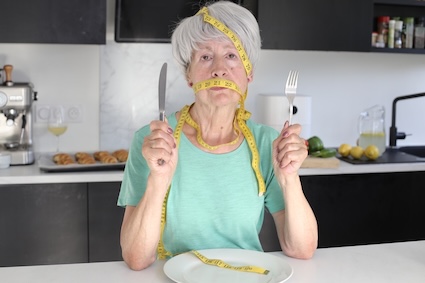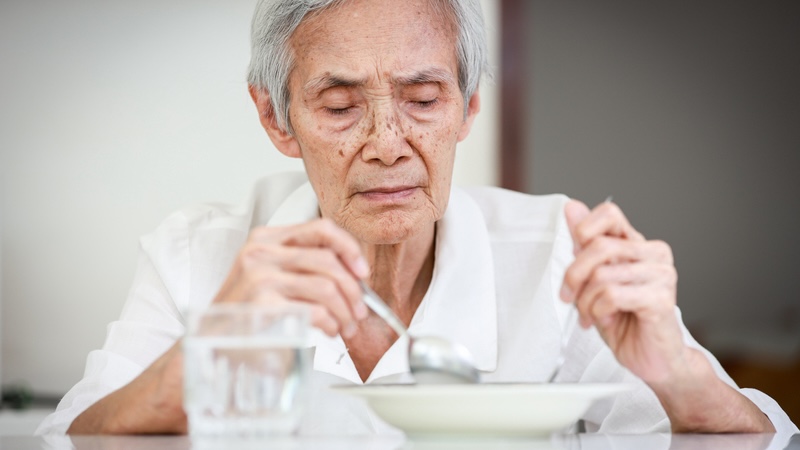Eating disorders among seniors are more common than many realize, stemming from a range of reasons. For some, these disorders resurface after earlier struggles; for others, the issues emerge for the first time. Either way, this often-overlooked health problem can have serious and even life-threatening consequences.
Every morning at the gym, Jane, who is in her late 60s, pushes hard on the treadmill and lifting weights. She’s there when you get there and still there when you leave. Even when you visit the gym at different times of the day, she seems to always be working out. You admire her dedication and may even envy her super-lithe figure. But behind the face of fitness and health she presents to the world, Jane may be acting on a feeling of losing control over her aging body. Besides her extended workouts, she may be starving herself to achieve an impossible, even dangerous, physical ideal.
Aren’t eating disorders just for young people?
While eating disorders have been stereotyped a “teenager’s disease,” many older people are also suffering in the shadows with these conditions, which include anorexia nervosa, bulimia, or a binge eating disorder. In fact, more women over 50 have eating disorder symptoms than breast cancer (13% compared to 12%). (There is less data around older men with eating disorders; however, one in three victims of eating disorders are men of all ages.)
While some older adults have developed an eating disorder recently, many others had problems earlier in life as well. Whether late-onset or a recurring problem, seniors can seek help for the struggles they’re facing.
Too long without treatment
 Eating disorders have the best outcome when diagnosed and treated early. For today’s seniors who developed eating disorders as adolescents or teens, little was understood about these conditions. It wasn’t until the 1980s, when Princess Diana spoke out about her bulimia and singer Karen Carpenter died from complications from anorexia nervosa, that eating disorders gained greater awareness and more effective treatments became available.
Eating disorders have the best outcome when diagnosed and treated early. For today’s seniors who developed eating disorders as adolescents or teens, little was understood about these conditions. It wasn’t until the 1980s, when Princess Diana spoke out about her bulimia and singer Karen Carpenter died from complications from anorexia nervosa, that eating disorders gained greater awareness and more effective treatments became available.
Even as new, more successful treatments came on the scene, those teens, who were now adults, still didn’t always reach out for help. Reasons included guilt, the stigma of the illness, or competing priorities like parenting or careers.
Men, who typically binge (with or without purging), may deny they even have a problem because they believe eating disorders to be a women’s issue and consequently, “unmasculine.” One 65-year-old man has suffered with compulsive, episodic binge eating for most of his life but never sought help, even though his sister died from an eating disorder at age 54.
Additionally, most treatment for eating disorders is geared toward the young. Even if a facility offers special programming for older patients, seniors may find themselves in therapy or even sharing a room in a residential facility with patients who are young enough to be their kids or even grandkids, which is not always conducive to recovery.
Financial barriers also exist for older patients, as most inpatient treatment facilities don’t accept Medicare. Even if they can afford to pay out of pocket, women, in particular, may not be able to check into a treatment center because of other responsibilities. To alleviate these barriers, some organizations currently offer virtual therapy and group sessions, nutrition counseling and check-ins.
Some causes of eating disorders among seniors
Aging inevitably leads to body changes, for men and for women: menopause, weight gain, redistributed body fat, and loss of muscle mass. These unwanted changes can lead to an eating disorder, whether a recurrence or a new problem. Challenging life events, like divorce, the need to care for aging parents, or the death of a loved one, can also trigger an eating disorder.
 As seniors with eating disorders come out of the shadows, physicians are seeing how long-term disordered eating can affect a person’s body. Cynthia M. Bulik, professor at University of North Carolina School of Medicine, explains, “One of the main concerns is that eating disorders take a tremendous toll on just about every bodily system. In old age, these body systems are less resilient to begin with, just because of the aging process, so eating disorders can erode them more quickly and more seriously.”
As seniors with eating disorders come out of the shadows, physicians are seeing how long-term disordered eating can affect a person’s body. Cynthia M. Bulik, professor at University of North Carolina School of Medicine, explains, “One of the main concerns is that eating disorders take a tremendous toll on just about every bodily system. In old age, these body systems are less resilient to begin with, just because of the aging process, so eating disorders can erode them more quickly and more seriously.”
Resulting health conditions include osteoporosis, arthritis, dental issues, weakened immune system, muscle atrophy, malnutrition, gastrointestinal problems, cardiovascular damage, and death.
A study of anorexia nervosa deaths (where anorexia was the primary cause of death or a secondary condition present at the time of death), as reported in the October 2021 issue of Systemic Reviews, found that most of those who died were 55 or older. Ten percent were 55 to 64, 12% were 65 to 74, and 28% were 85 and older.
Spotting an eating disorder
Often eating disorders in older adults are missed since many of the signs, such as weight loss, malnutrition, osteoporosis, and muscle atrophy, can be chalked up to the normal aging process. Men with an eating disorder usually focus on building muscle rather than losing weight, which makes detection difficult. Signs to look for include:
- Pushing food around on the plate or hiding food
- Avoiding mealtimes
- Using the restroom immediately after meals
- Talking about weight frequently
- Dieting or using diet pills
- Skipping meals
- Being rigid about food choices
- Unexplained weight loss
- A fixation on exercise or on extreme exercise routines
When approaching someone about a potential eating disorder, Dr. Maine suggests mentioning that you’ve noticed a weight loss (or change in their body) and ask if something might be going on. If the person is open to discussing the issue further, you might ask them the following questions from Harvard Health Publishing. These questions are also good starting point to ask yourself if you suspect that you might also be suffering from an eating disorder.
- Do you worry about your body and aging more than your friends do? What efforts do you make to hide these changes?
- If you had the choice between living an extra five years and attaining your perfect weight, would you pick attaining your perfect weight?
- Do you and your friends spend a lot of time discussing diets, weight, your looks, gym routines, etc.?
- Does the number on the scale determine your mood for the day?
- Do you spend an inordinate amount of time planning what to eat and not to eat and how to get enough exercise?
- Do you gravitate toward health regimens that involve purging or restricting food, for example, going gluten- or yeast-free, becoming a vegan, fasting, or doing colonics or cleanses?
If the answer to any of these questions is “yes,” don’t ignore the problem. Reach out to a doctor or a therapist for help and to advise on next steps.
For more information and resources about eating disorders, visit the National Eating Disorders website or the National Association of Anorexia Nervosa and Associated Disorders.





